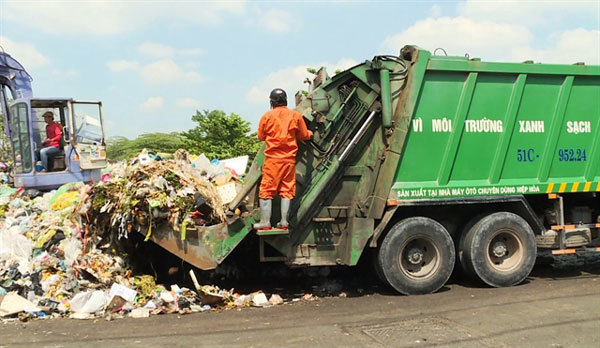German technology to power HCMC’s first waste-to-energy plant in late 2020
Waste-to-electricity projects in big cities appeal to investors
 |
Waste-to-energy technology systems, which are developed with environmental safety and standards, can reduce the volume of waste going to landfills, said Luu Duc Cuong, director general of the Viet Nam Institute for Urban and Rural Planning.
"Source separation of domestic waste, considered the best waste management approach, has not been implemented successfully nationwide, so mixed-waste incineration without solid-waste segregation will be the appropriate technology for urban solid waste in Vietnam," Cuong said.
"For the long term, intensive waste-to-energy technology such as pyrolysis and gasification should be implemented," he said.
However, the high investment and operation costs are a concern for decision-makers, Cuong said at the Waste Management and Waste to Energy Asia Summit that opened yesterday in HCM City.
Small-scale incinerators have dioxin and furan pollution risks, he said.
Nguyen Huy Phuong, of the HCM City Department of Natural Resources and Environment’s division of solid waste management, said the city government had offered incentives to local and foreign investors to invest in waste treatment projects.
The city has prepared land covering 72,500 sq.m, with site clearance compensation completed at the Tay Bac solid waste treatment complex in Cu Chi District, for investment in new plants, he said.
The city targets reducing the landfill rate to 50 per cent by 2020 and 20 per cent by 2025, Phuong said.
Landfills have become unsustainable as they lead to leakage of hazardous elements and wastewater into the environment.
Last month, construction on the first waste-to-energy project began at the Tay Bac solid waste treatment complex in Cu Chi District.
The US$400-million plant is developed by Vietstar JSC, with the first phase capacity of 2,000 tonnes per day.
More waste-to-energy plants in the city will kick off, including solid waste treatment plants of Tam Sinh Nghia JSC and Tasco Cu Chi Environment Ltd Co., he said.
"Domestic solid waste in HCM City has increased at an average rate of five per cent annually due to rapid urbanisation," he said.
Experts said that mass incineration usually requires substantial additional energy such as fuel and coal, and emits significant pollution during unsorted mass waste burning.
Mass incineration limits the possibilities of beneficially reusing and recycling the waste. Over the long-term, it is not a sustainable solution, and is not environmentally and economically viable. VNS
 Waste-to-energy technology is a feasible solution for the solid waste crisis in Vietnam's major cities, local authorities have said.
Waste-to-energy technology is a feasible solution for the solid waste crisis in Vietnam's major cities, local authorities have said.